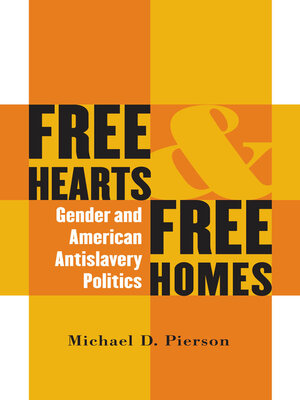Free Hearts and Free Homes
ebook ∣ Gender and American Antislavery Politics · Gender and American Culture
By Michael D. Pierson

Sign up to save your library
With an OverDrive account, you can save your favorite libraries for at-a-glance information about availability. Find out more about OverDrive accounts.
Find this title in Libby, the library reading app by OverDrive.



Search for a digital library with this title
Title found at these libraries:
| Library Name | Distance |
|---|---|
| Loading... |
By exploring the intersection of gender and politics in the antebellum North, Michael Pierson examines how antislavery political parties capitalized on the emerging family practices and ideologies that accompanied the market revolution.
From the birth of the Liberty party in 1840 through the election of Republican Abraham Lincoln in 1860, antislavery parties celebrated the social practices of modernizing northern families. In an era of social transformations, they attacked their Democratic foes as defenders of an older, less egalitarian patriarchal world. In ways rarely before seen in American politics, Pierson says, antebellum voters could choose between parties that articulated different visions of proper family life and gender roles.
By exploring the ways John and Jessie Benton Frémont and Abraham and Mary Todd Lincoln were presented to voters as prospective First Families, and by examining the writings of Harriet Beecher Stowe, Lydia Maria Child, and other antislavery women, Free Hearts and Free Homes rediscovers how crucial gender ideologies were to American politics on the eve of the Civil War.
From the birth of the Liberty party in 1840 through the election of Republican Abraham Lincoln in 1860, antislavery parties celebrated the social practices of modernizing northern families. In an era of social transformations, they attacked their Democratic foes as defenders of an older, less egalitarian patriarchal world. In ways rarely before seen in American politics, Pierson says, antebellum voters could choose between parties that articulated different visions of proper family life and gender roles.
By exploring the ways John and Jessie Benton Frémont and Abraham and Mary Todd Lincoln were presented to voters as prospective First Families, and by examining the writings of Harriet Beecher Stowe, Lydia Maria Child, and other antislavery women, Free Hearts and Free Homes rediscovers how crucial gender ideologies were to American politics on the eve of the Civil War.







